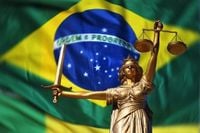Brazilians marked their Independence Day on September 7, 2025, not just with the usual patriotic fanfare, but with a nation visibly split down the middle. As military parades and barbecues unfolded in cities across the country, thousands poured into the streets for rival rallies—some defending democracy, others rallying behind former President Jair Bolsonaro, who now stands accused of masterminding a coup attempt after losing the 2022 election to Luiz Inácio Lula da Silva.
The tension in Brazil has reached a fever pitch as five Supreme Court justices prepare to deliver their verdicts this week on whether Bolsonaro orchestrated a plan to cling to power. The allegations are grave: from proposing a coup to military commanders and knowing of assassination plots against Lula da Silva and Supreme Court Justice Alexandre de Moraes, to inciting supporters to storm government buildings on January 8, 2023, after casting doubt on the country’s electronic voting system. According to BBC, Bolsonaro’s charges include acts against the democratic rule of law and efforts to undermine the very heart of Brazil’s electoral process.
Bolsonaro, currently under house arrest, has vehemently denied the charges, claiming the prosecution is nothing short of political persecution. This view isn’t just confined to his supporters at home. Former US President Donald Trump has thrown his weight behind Bolsonaro, calling the trial “political persecution” and going so far as to impose 50% tariffs on Brazilian goods and sanctions on Justice Moraes, who is leading the trial. In late July, Trump even issued an executive order declaring the “persecution” of Bolsonaro a threat to US national security, economy, and foreign policy. Trump accused several Brazilian officials of abusing their judicial power and unfairly targeting Bolsonaro with criminal charges, as reported by BBC and other outlets.
Bolsonaro’s son, Eduardo—himself a member of Brazil’s Chamber of Deputies—has been a vocal supporter of these US measures. Speaking to the BBC last month, Eduardo said, “Freedom comes first, before the economy,” after successfully lobbying for the tariffs. He also took to social media to thank demonstrators and Trump, describing them as “pro-freedom protesters fighting on the right side.”
This international dimension has only deepened the rift in Brazil. Many Brazilians, even some on the right, see the support for US sanctions as unpatriotic, especially when it inflicts economic pain on their own country. “Brazil is totally divided,” said Bianca, who attended a large pro-Bolsonaro rally in São Paulo, her shoulders draped in a flag blending the stars of the US with Brazil’s green and yellow. She added, “But I believe with US sanctions, those who were in favour [of the trial] are taking their foot off the gas.”
Patriotic symbols like Brazil’s national flag and football shirt have long been adopted by Bolsonaro’s right-wing base, but this year, Trump paraphernalia was also on display. Crowds chanted “Amnesty!” and “Moraes, out!”—a clear sign of their anger at the judiciary. Erica, another protester, dismissed the trial as “just a big theatre because everyone knows his conviction is already determined.”
But not everyone sees it that way. At a nearby anti-Bolsonaro rally, demonstrators chanted “no amnesty” and “dictatorship, never again.” Huge inflatable figures of Bolsonaro in a prison uniform and Trump floated above the crowd, while signs demanded, “Prison for Bolsonaro” and “Trump, paws off Brazil.” Karina, a protester in a red T-shirt, told BBC, “All the evidence shows it was a coup attempt. I hope justice is done to show you can’t do whatever you want for your own gain.”
For many, the trial is about more than the fate of one man—it’s a test of Brazil’s young democracy, restored in 1985 after two decades of dictatorship. The Supreme Court casts itself as the guardian of this democracy, but it’s also become a lightning rod for accusations of bias. Its judges, appointed by presidents, can put presidents and ministers on trial, and some even sit on the electoral court. Critics, especially among Bolsonaro’s supporters, point to Justice Moraes’ dual role as both rapporteur and alleged assassination target as evidence of overreach.
The court’s recent inquiry into fake news, which led to the jailing of Bolsonaro allies and the removal of social media accounts, has only fueled the controversy. Supporters of the court see it as a model for the digital age; critics argue it stretches judicial powers into policing and politics. The trial has thus become a battleground over what constitutes authoritarianism in Brazil.
One case often cited by those who believe the judiciary has gone too far is that of Débora Rodrigues dos Santos, a Bolsonaro supporter who received a 14-year sentence for scrawling “You lost, idiot” in lipstick on the statue of Justice outside the Supreme Court during the January 8 riots. Her sentence was later commuted to house arrest because she cares for children, but the fact she was tried on coup charges continues to anger many. “They tried her for graffiti. I’ve never heard of someone being sentenced to 14 years in prison for lipstick. It was a demonstration, and they were labelled as terrorists,” her sister Claudia told the BBC. Claudia insisted Débora regretted the graffiti but not her right to protest, arguing, “If he is convicted of a coup, that also condemns 1,200 people who were protesting there.”
Others, however, see the January 8 events as much more than a protest. Ricardo Cappelli, the former minister tasked with restoring order in Brasília after the storming of key government buildings, described the “coup-mongering” protesters as having committed “barbaric acts” and “symbolically attacking an institution fundamental to Brazilian democracy.” Cappelli told the BBC he hopes this trial “will help turn a page in history,” adding, “Never have those behind a coup or attempted coup sat in the dock in Brazil.” He believes the trial sets a global example, suggesting that if the US Capitol riots had happened in Brazil, “Donald Trump would most likely be sitting in the dock.”
As the Supreme Court prepares to issue its ruling, Bolsonaro’s party—which holds a majority in Congress—is pushing a bill to grant amnesty to both Bolsonaro and the January 8 protesters. The stakes couldn’t be higher. Article 359-M of the Brazilian Penal Code criminalizes violent attempts to abolish the democratic rule of law, carrying sentences from four to twelve years in prison. Mr. Cappelli’s warning to those advocating for amnesty is stark: “Study history. Amnesty for past coup attempts resulted in new coups. Today's pardoned coup plotter becomes tomorrow's coup plotter.”
For years, Bolsonaro has been a polarizing figure, splitting Brazil into loyalists and critics. For his supporters, this trial is persecution for a coup that never happened; for his detractors, it’s a necessary step to safeguard democracy. Even some moderate right-wingers hope the trial might finally draw a line under years of division, but with such deeply entrenched views, the nation’s polarization seems unlikely to fade anytime soon.
With the verdict imminent, Brazil stands at a crossroads—grappling with its past, its institutions, and the very meaning of democracy in the face of unprecedented political turmoil.


